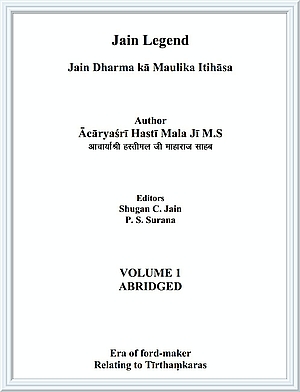Following the third Tīrthaṃkara of Jain religion Lord Saṃbhavanātha, Lord Śrī Abhinandana was the fourth Tīrthaṃkara. He was born in Ayodhya at the house of king Saṃvara. In his past life as king Mahābala he took initiation from Ācārya Vimalacandra and worshipped twenty reflections / causes (sthānakas or kāraṇas) of Tīrthaṃkaranāma karma and at the end, after his demise, was born as Anuttara god in the palace Vijaya. Descending from Vijaya palace (vimāna) he entered the womb of queen Siddhārthā on the fourth day of the bright half of the month Vaiśākha under the constellation Punarvasu. The queen saw the 14 great dreams, which made both her and the king very happy. On completion of her pregnancy period queen Siddhārthā gave birth to her son on the second day of the bright half of the month Māgha under the constellation Puṣya. From the time he entered her womb there was happiness all over, hence the parents and others named the child Abhinandana.
When Abhinandana reached marriageable age king Saṃvara got him married to suitable women. After this king Saṃvara became disinclined towards worldly pleasures and took initiation as a monk, and placing Abhinandana on the throne went on the spiritual self-restraint path. As a king Abhinandana ruled his kingdom in the best way and in his reign, taught his subjects about justice and to dispense their duties. In a detached manner after ruling peacefully and justly for thirty-six-and-half lakh pūrvas he decided to take initiation. On the request of the lokāntika gods and giving charities for one year, on the 12th day of the bright fortnight of the month Māgha under the constellation Abhijita, pulling out five fistfuls of hair, and giving up all the bad karmas, along with one thousand other kings, he renounced the worldly life
He did the two days 'belā' penance at the time of his initiation. The next day he broke his fast at the house of king Indradatta. The gods cried out, "aho dānaṃ, aho dānaṃ" ('Ah! the beautiful gift!') making a shower of five substances, flowers, etc. After initiation, for many years, he observed severe austerities and wandered about. Devoid of passions in the attitude of self-restraint after wandering as a mendicant for 18 years, he attained pure knowledge and kevaladarśana in Ayodhya, on the 14th day of the bright fortnight of the month Pauṣa under the Abhijita constellation, after completely destroying the four obscuring karmas, namely, knowledge obscuring (jñānāvaranīya), Intuition obscuring (darśanāvaraṇīya), Deluding (mohanīya) and Interfering (antarāya). Thereafter, he gave a sermon in the assembly of gods and men, explaining the difference between good and bad and showing the path towards well-being and established the four-fold order ultimately becoming a Tīrthaṃkara.
Lord Abhinandana spent 12 lakh pūrvas as a youth, 8 lakh pūrvāṃgas plus 36-and-a-half lakh pūrvas as king, and 8 pūrvāṃgas less than 1 lakh pūrvas as a monk, and this way, after spending a life of 50 lakh pūrvas, when his life came to an end, he undertook a fast for one month along with 1000 monks, and destroying all karmas, attained nirvāṇa on the eighth day of the bright half of the month Vaiśākha under the constellation Puṣya. Innumerable souls found their means of salvation through his pure teachings. 116 gaṇas and Gaṇadharas, 14000 omniscient, 11600 telepaths, 9800 Avadhijṅānī, 1500 who knew the 14 purvas (pūrvadhāris), 19000 Vaikriya, 11000 vādīs, 300000 monks, 630000 female-monks, 288000 votaries and 527000 female votaries were part of his large congregation.
 Acharya Hasti Mala
Acharya Hasti Mala
